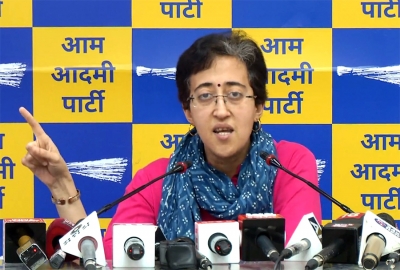New Delhi: The ruling AAP Saturday termed the Centre’s ordinance on transfer of bureaucrats in Delhi “unconstitutional” and a “brazen assault” on the democratic principles of the country.
Addressing a press conference, Delhi minister Atishi said the Centre deliberately chose to bring the ordinance at a time when the Supreme Court has closed for summer vacation.
The Centre promulgated the ordinance Friday to create a National Capital Civil Service Authority for transfer of IAS and DANICS cadre officers and disciplinary proceedings against them.
This came a week after the Supreme Court handed over the control of services, excluding those related to police, public order and land, to the elected government in Delhi.
Atishi claimed the ordinance shows Prime Minister Narendra Modi is “scared” of Chief Minister Arvind Kejriwal and the power of honest politics.
“In a late-night move that reeks of an attack on democracy and the Indian Constitution, the central government hastily introduced an ordinance aimed at undermining the power of the elected Delhi government. This audacious attempt to snatch away the authority granted to the Delhi government by the highest constitutional bench of India, the Supreme Court, is a brazen assault on the democratic principles that the country upholds,” she said.
Noting that this is “not the first instance” when the Centre has sought to “curtail” the power of the elected Kejriwal government, she went on to highlight previous instances.
In 2015, when the AAP government secured an overwhelming majority with public support, winning 68 out of 70 seats in Delhi, the BJP government issued a notification within three months in an endeavour to strip the elected Kejriwal government of its rightful power, she recalled.
She added that the Centre, through a notification from the Ministry of Home Affairs (MHA), declared that the Kejriwal government does not have control over crucial services matters such as the transfer and postings of bureaucrats, or to take action against inefficient officers. According to the government, these powers resided with the central government, contravening the established order.
“After a gruelling eight-year legal battle in the high court and Supreme Court, on May 11, the Constitution bench of the Supreme Court ruled against the Centre. The SC’s decision unequivocally affirmed that the power to govern lies with the Delhi government,” she said.
The Supreme Court relied on three key sections of the Indian Constitution to support its ruling — the principles of the federal structure of the Constitution, Article 239 (AA), and the accountability of bureaucrats towards the elected government.
“In line with the democratic principles enshrined in the Constitution, Article 239 AA outlines the responsibility of an elected government in Delhi’s Legislative Assembly to implement the will of the people. The accountability of bureaucrats towards the elected government is a fundamental constitutional principle,” Atishi explained.
Alleging that the Centre found it difficult to accept this reality, she said that this was done to halt the work of the Delhi government.
Asserting that the Centre is fully aware that this ordinance is unconstitutional and will undoubtedly be struck down by the Supreme Court, she noted that Section 3A of the ordinance claims that the elected government of Delhi, including the Delhi Legislative Assembly, holds no authority to pass any rules pertaining to the services department.
A new authority, the “National Capital Civil Services Authority,” will be established for transfer and postings in Delhi. This authority will consist of three members, with the Chief Minister of Delhi serving as the Chairperson, and the Delhi Chief Secretary and Home Secretary as members.
“However, it is vital to note that the Delhi government will not have the power to appoint the Chief Secretary and Home Secretary; instead, these appointments will be made by the Centre government. Consequently, despite being the Chairperson, the Chief Minister will find himself in the minority, lacking decisive authority. Additionally, if the secretaries, while serving as members of the authority, make decisions contrary to the will of the central government, the Lieutenant Governor will possess the right to override those decisions,” Atishi said.
In a nutshell, this ordinance proclaims that regardless of the Delhi people’s election of Kejriwal as their chief minister, the Delhi government will be dictated by the central government, she said.
Claiming that the Centre has no legal right to enact this ordinance, she underlined that in its order, the Supreme Court explicitly stated in paragraph 160: “The involvement of the Union of India in the administration of NCTD is limited by Constitutional provisions, and any further expansion would be contrary to the Constitutional scheme of governance.”
“This signifies that while passing the order, the Supreme Court was well aware that the Union of India, or the Central government, would attempt to diminish the powers of the elected government of Delhi at any cost. Hence, the Supreme Court issued this order to prevent such encroachments on the constitutional balance,” she said.
Senior AAP leader and Rajya Sabha member Sanjay Singh also lashed out at the Centre over the ordinance, saying it does not want the Kejriwal government in Delhi to function.
“The Centre doesn’t follow the court orders and it doesn’t care about what the Constitution says. It disregarded a court order by bringing the ordinance to give the control of services back to the LG,” Singh said at a separate press conference.
“The Centre only wants dictatorship. It does not believe in the Constitution or laws of the country and this is why it brought the ordinance. This matter will definitely go to court. This isn’t limited to CM Kejriwal Vs PM Modi, this is about the future of the country, its democracy and constitution,” he asserted.
PTI






































